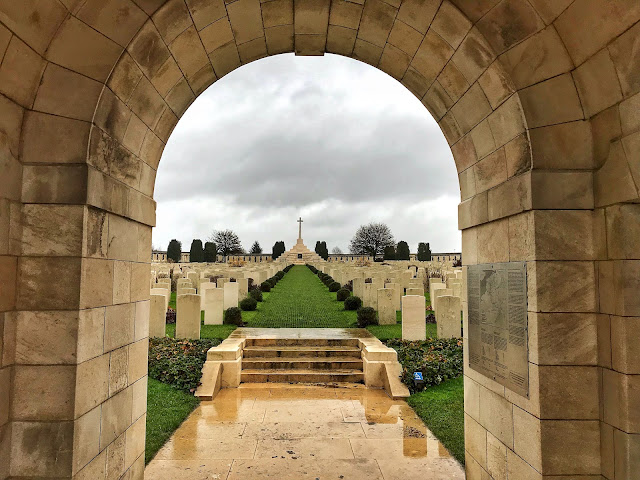DPhil Diaries One: My PhD Application Process (PhD/ DPhil History)
This is the first in a new series of blog posts in which I hope to document my three years studying DPhil History at Pembroke College, Oxford.

This week I will be moving into university to begin my PhD (Oxford calls this a DPhil). It has now been six months since I received my offer of a place at the University of Oxford, and I can't wait to get started. However, before beginning the whole application process, I never really knew much about what it entailed or what a 'typical' experience was. I hope this article will shed light on the process for anyone else applying for a PhD/ DPhil, as well as documenting my experience.
My decision to take a doctorate in history developed over the course of my MA year. In my dissertation research I had found a niche in First World War history that I was interested in and uncovered so much scope for further study that I just couldn't ignore. Having scratched the surface in my MA, I was hooked and wanted to delve so much deeper. By this time I had also started attending conferences and meeting historians.Studying a PhD began to feel possible and I started looking further into it.
I was studying my MA at the University of Birmingham (on their history of warfare program) so my first port of call was to their PhD admissions webpage. Provided I maintained my standard of work, I could meet their entry criteria of an MA at merit or above. I then began to look elsewhere, at Manchester where I'd loved studying my BA, and Durham, where I knew Professor Michael Snape was one of the leading historians for my area of research.
However, nagging at the back of my mind was the possibility of applying to Oxford. Buoyed by positive feedback, I was feeling confident in my MA work and considered a second crack at applying for what is, let's be honest, my dream university. Having been rejected as an undergraduate, I was wary but felt like I stood a much better chance for postgrad entry.
After handing in my MA dissertation, my first active step in applying was to meet with my Birmingham tutor, Dr Jonathan Boff, to discuss how the process worked. I don't come from an academic family and didn't really understand the whole PhD system. It was a really positive meeting, especially as he mentioned applying to Oxbridge even before I did.
Mostly through online research I settled on applying to Oxford and Durham. I also toyed with Cambridge, but I couldn't find a good fit for a supervisor, and kept Birmingham in mind for a back up.
The deadlines for PhD applications (whether formal or financial) were all around January, so I took an office job for the year after my MA to give me time to do my application and earn money in the process. Looking at the online application form it was a lengthy process. I had to choose a potential supervisor and preferred college, submit a research proposal and a CV, answer some questions, choose a chapter of my MA work, and arrange references (two for Durham; three for Oxford).
I had heard from others that it could increase your chances of getting in to PhD programs if you met with your preferred supervisor. I have no evidence for whether this is true (and in many ways, I doubt it really helps that much), but I figured I had nothing to lose. I already knew Prof Snape at Durham, and using the Oxford faculty list I narrowed my choice to Professor Adrian Gregory and Dr Matthew Grimley. I had heard elsewhere that Prof Gregory was oversubscribed with supervisions (again, I don't actually know this for a fact), so I took a punt and emailed Dr Grimley with a very rough research proposal and asked to meet.
On an October afternoon, I met with Dr Grimley at Merton College. It felt odd to be back in the city; I had last been there five years previously for my UG interview at Merton, but I also remembered how special a place it was. The meeting was really useful, and Dr Grimley was both lovely and helpful, and the experience confirmed to me that I really did want to give Oxford my best shot. In preparation for the meeting I had read some of his work that matched my area of interest, so I already felt that I knew about his work in advance. This was really helpful as at the meeting we discussed both what I expected him to be able to help me with, and areas he thought I should be considering in more depth.
As my preferred college, I chose Balliol, mainly for its brilliant graduate facilities, large size and good reputation. In hindsight I maybe didn't make the best choice: prioritising a college with scholars similar to my interests and a library stacked with books useful to my research would have been better. But without jumping ahead too much, it also didn't really matter. My pro-tip would be to not get hung up on the choice as things usually work themselves out, and in any case it is common to get reallocated to a different college in the application process.
The longest part of the application form, at least in the time it took to complete, was the research proposal. I knew what I wanted my research to be about, but phrasing this into a two page proposal was entirely new. I was lucky in the help I received from Dr Boff who assisted with knocking the piece into shape. He encouraged me to be assertive and confident (eg. to write "I will study" rather than "I'd like to") and on the balance of the proposal. I included paragraphs on historiography and the gap I perceived my work filling, primary evidence I would use, my experience with the research area, and why I believed Oxford (or Durham) was the best place to study. I wrote separate endings for each, detailing research projects and archives which were associated with my subject at the universities. I have no way to know whether this is the best breakdown, and it certainly isn't a cookie cutter experience, but this worked for me in setting out my metaphorical stall, whilst being succinct.
For my CV I kept it to a brief two pages and focused it on the key information. I started with my degrees, including the titles of my dissertations, and my school grades. Then I included sections on publications (articles for a local journal and newspaper, and for an online magazine), conference proceedings, and local history (eg. WI talks and small exhibitions). I also had a section about my blog and a small piece on my employment. From talking to academics about this, I think keeping the CV simple and clear is best. I discussed my interests and motivations elsewhere, so this was a space purely to lay out my qualifications and the required data for the entry criteria.
The final stage of the Oxford application is funding applications. I filled one out for the Ertegun scholarship which was attached to the main application form, and later one for the Asa Briggs scholarship which I emailed directly to Worcester College. All other scholarships I would be considered for without further forms. I spent far longer than necessary on my Ertegun application, especially as there was such a small chance of me even being considered for it. Nonetheless, it was definitely worth applying for as it is such an amazing opportunity.
The application process took in total, two to three months, working on the form on and off. I spent most of that time self-doubting everything I wrote and worrying if it was the best it could possible be but in the end I was proud of my submissions and felt like they were good representations of my work. I knew that I had given them my best shot. I submitted the middle chapter of my MA dissertation as I felt this was my strongest, and I agonised for far longer than necessary on the brief questions in the form. These include a summary sentence of the proposal and a brief line on career plans (I made a flippant comment here about wanting to be Dan Snow, that I regretted until the moment I received my offer).
The application process took in total, two to three months, working on the form on and off. I spent most of that time self-doubting everything I wrote and worrying if it was the best it could possible be but in the end I was proud of my submissions and felt like they were good representations of my work. I knew that I had given them my best shot. I submitted the middle chapter of my MA dissertation as I felt this was my strongest, and I agonised for far longer than necessary on the brief questions in the form. These include a summary sentence of the proposal and a brief line on career plans (I made a flippant comment here about wanting to be Dan Snow, that I regretted until the moment I received my offer).
And then, that was it. Whether I myself believed it, I was ready to submit my application forms. For Durham I simply clicked 'submit' but for Oxford there was a £75 charge. I understand they do this to cut down on extra/ half-hearted applicants, but it still felt steep for an application with such a high rejection rate. Then the great long wait began, for what was stated to be eight to ten weeks but for what felt like forever.
Kathryn
Kathryn


Very interesting Kathryn! What a journey :) congratulations again I'm sure you're going to have a ball at Oxford
ReplyDeleteThank you, I can't wait to get started!
DeleteCongratulations on all your achievements. My daughter has just started a PhD in politics at Keele Uni. I hope you both enjoy the experience. I love history, especially
ReplyDeleteWW1 so thank you for sharing your blog and the richness of information and facts it provides.
Thank you so much, I can't wait to get stuck in with the course now.
DeleteKathryn